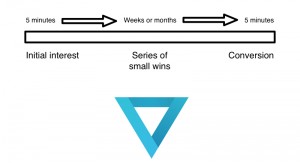At this point it’s easier to list the features that Arturia’s Pigments doesn’t have than ones it does. The company has been rolling out regular updates for a few years now, and each new version adds something worth getting excited about. New synth engines, new effects, whole new utility sections – it’s both a place for Arturia to experiment with new ideas, and show off some of highlights from its lineup of vintage emulation.
At first blush Pigments 4 seems like a comparatively minor update. There’s some new effects, a handful of enhancements to the various oscillators, but there’s not much to reach out and demand your attention from a simple headline. This seemingly subtle upgrade hides a lot of quality of life enhancements, though.
For one, now you can simply drag and drop modulation sources to their target. Granted, clicking LFO one and then clicking on the filter cut off wasn’t particularly difficult. But now you can just drag the little tab over an LFO to whatever you want to modulate. It should make Pigments a little less intimidating to those just learning how to navigate the synth. There’s also now left and right arrows on multimode modules, like the filter, that lets you quickly change types, where previously you had to click and open a drop down menu to select a new option.
The most dramatic UI changes are thankfully optional. First is the new Play tab, which strips away most of the sound design options and focuses on a core set of tweakable parameters. You can’t change effects here, or set modulation preferences. It’s designed to just get you making noise without too many distractions. It’s fine for live performance or if you prefer to stick with the presets, but hides a lot of the depth that makes Pigments so compelling.
The other major interface change is a bit of a head scratcher. See, while most companies are rushing to implement dark mode to save your eyes, Arturia has decided that Pigments is too dark and added a light mode. I’m sure there are those out there who will enjoy its bright gray panels, but I’m personally not a fan. Not only do I think the original theme is easier to stare at for prolonged periods of time, but it’s also just more consistent. There are many elements of the interface that remain dark even in light mode and it looks a bit cobbled together.
That’s a pretty minor nitpick though, considering that once you get past the UX, there’s a handful of new toys to play with in Pigments 4. There’s a new filter borrowed from the company’s MS-20 emulation, ring mod in the wavetable oscillator, super unison in the analog oscillator, a dedicated mod oscillator, an improved bit crusher and (wait for it) shimmer reverb!
The MS-20 filter might seem unnecessary considering Pigments already had 10 different filter options, many with multiple modes, but it does bring something special to the table. Rather than using it as you would any other lowpass filter, the MS-20 begs to be run at extremes. Crank the resonance and turn on keyboard tracking, and you can transform simple white noise into a delicate plucky key sound with a subtle crackle. Or just crank the volume on it and hit it with the hottest signal you can (though make sure to turn down the master volume or you’ll risk blowing out your ears) to get some crunchy saturation.
Ring Mod delivers some nice icy timbres. Though, this is not something that Pigments was exactly lacking before. It’s a welcome addition, but definitely not something that you’d miss too dearly if it quietly disappeared. The more exciting changes are to the Bit Crusher effect (as opposed to the one built into the sample engine). The addition of jitter, scale and new decimator options really let you fine tune the exact flavor of digital destruction you’re looking for.
Oh, then of course there’s the shimmer reverb. It does what it says on the tin. Personally I think it’s an essential effect, and I’m shocked Arturia hasn’t added one until now. There’s nothing about it that stands out particularly, but if you’re using Pigments to create granular soundscapes or ambient plucks, then you’ll be thankful it’s here.
Arturia also added 63 new wavetables, 67 new samples and 36 new noise types, plus a pile of new presets. And, if the new library of included patches isn’t enough for you, there’s also three new sound packs: Wavelengths Lo-fi, Wavelengths Neuro Bass and Wavelengths Cinematic to broaden your sonic palette.
Pigments 4 is available now as a free upgrade for existing owners. New customers have a chance to pick it up at an introductory price of $99 until January 4th, after which the price will go back up to $199.
(14)
Report Post






